With additional support from













With additional support from












This is an intentional space for learning and unlearning. The time that we’re in is knowing what we don’t know and being ok with that — giving a breath to sit with ourselves in very challenging times — remembering joy — remembering connection.


I entered this event: knowing what I didn’t know. As someone with an invisible disability, this is something that is close to my heart. Many of us are educators, but this is not age restricted.

Thursday, November 17, 2022
10am - 4pm

Photoville’s mission is to provide the community with the opportunity to experience incredible visual storytelling in accessible public locations free of charge and to uplift and amplify diverse storytellers. This workshop for educators, led by Stephanie Alvarado, an introduction to the language and movement history of the disability community, and featuring a photography zine workshop with artist/activist Jen White-Johnson, giving participants an opportunity to explore relevant themes and connect with other educators.
Photoville (photoville.com) believes that art is fundamentally a collaborative process between artists and their audiences, and public art creates the perfect conditions to foster creative exchange. Through free public art, educational programming, and professional development, we offer visual storytellers funding,mentorship, promotional and production resources.
“There is so much that able-bodied people could learn from the wisdom that often comes with disability. But space needs to be made. Hands need to reach out. People need to be lifted up.
The story of disabled success has never been a story about one solitary disabled person overcoming limitations—despite the fact that’s the narrative we so often read in the media. The narrative trajectory of a disabled person’s life is necessarily webbed. We are often only as strong as our friends and family make us, only as strong as our community, only as strong as the resources and privileges we have.”
- Alice Wong

Stephanie Alvarado is a queer gender nonbinary disabled femme antidisciplinary artist, poet, archivist, photographer, facilitator and cultural organizer for 20 years. Stephanie was born and raised in the Bronx, NY by way of Guayaquil, Ecuador. They alchemize photography, feminist performance, community based photo archiving, and political education into community building and social justice practices in public spaces for people of color. Their work is rooted in spiritual community healing, social justice, and local memory. They host intergenerational photo archiving teach-ins on public park land and community gardens to reclaim public space as cultural reparations for Black, Brown, and Indigenous communities. Stephanie has held artist residencies and fellowships at Wave Hill Public Garden and Cultural Center, The Caribbean Cultural Center African Diaspora Institute, Witness for Peace, and The Laundromat Project. They’ve had poetry readings at Snug Harbor Cultural Center and Botanical Garden, Pregones Puerto Rican Traveling Theater, and Kelly Street Garden. They have facilitated retreats for the NYC Network of Worker Cooperatives and been an adjunct professor at Hunter College School of Social Work. They currently serve on the Board of Directors for The Literary Freedom Project. Their work was recently published in Korea Art Forum’s Shared Space, Shared Dialogues artist catalog. Stephanie received their BA from NYU in Psychology, Latino Studies and Public Policy, and her MA in Women, Gender, and Sexuality Studies from Emory University.
Community Intentions
» Respect and rapport
» Confidentiality
» Active Listening

» Taking care of ourselves
» Make space, take space
» Humor
» Open mindedness
It’s important to honor that memories might sometimes be hard to bring up. Things may not be purely a good or bad memory. When we share memories, we’re building a collective memory. We all shared this memory today. Especially as Indigenous, Black and Brown, disabled people. We have folks who are bearing witness to our pain, and sadness. All of it is valid.
Think of all the teachers you’ve had. Let’s think about their intentions with reaching out to us. We’re a work in progress, always. Think about that tenderness when you first felt when you were seen or inspired by an educator. Bring that warmth to your heart in this moment.
Today is an offering of models or tools that you can bring to the classroom, your partner, etc. Think about how sacred that trust is. Listen actively. Be checked in with your body when you’re building community, especially with children with disabilities.

We are all living archives. The power of knowing how to preserve your photographs, knowing how to tell your story, goes beyond institutions – it’s really a way to empower and reinforce the brilliance that is in the room - in your life, your family’s life, and your community.
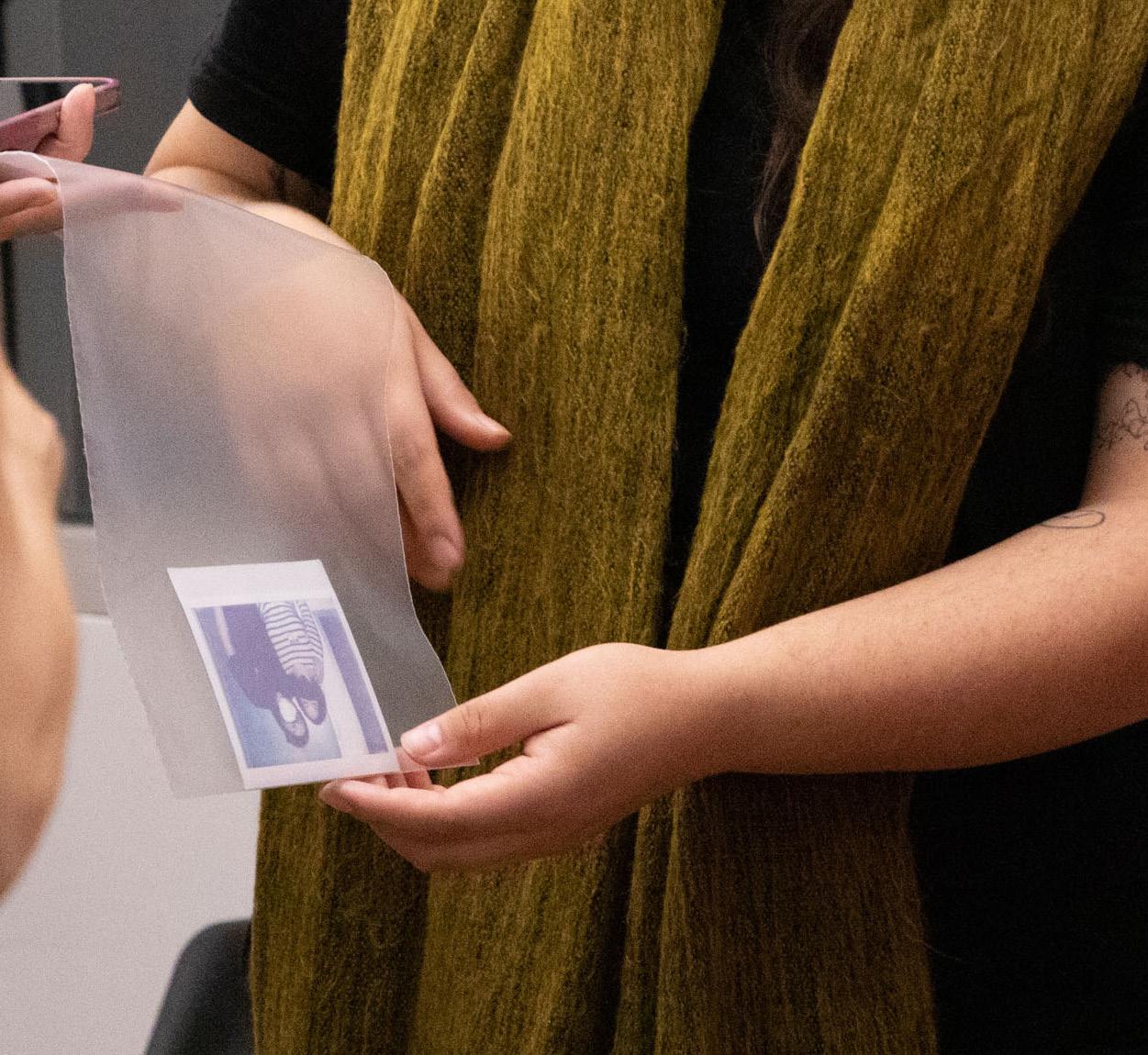
Our history is intentionally white-washed. We have the power in our hands as educators, community members, as lovers, as friends, to create a time capsule. When you look at the timeline outside, think about how powerful it would be for students to create their own classroom timeline. What happened in the history of the cultures that are in this classroom?
Disability Justice Timeline - Think About These Questions
* What events stood out to you most and why?
* What connections do you see to your own experience as an educator?
* What would you like to add in the timeline?
* What is the relationship between the timeline and photo archives?
Use archiving as a form of disability justice — to have students have an example of how to see themselves, honor their stories, and community. Fotos y Recuerdos is about remembering for those who cannot and bearing witness to the joy in sharing stories in community for generations to come in the present. Inspired by the disability justice principles of interdependence and collective access towards collective liberation.
Archive Toolkit

What Is An Archive?
It Is A Living Story - Preserve Your History
» Building Your Archive:

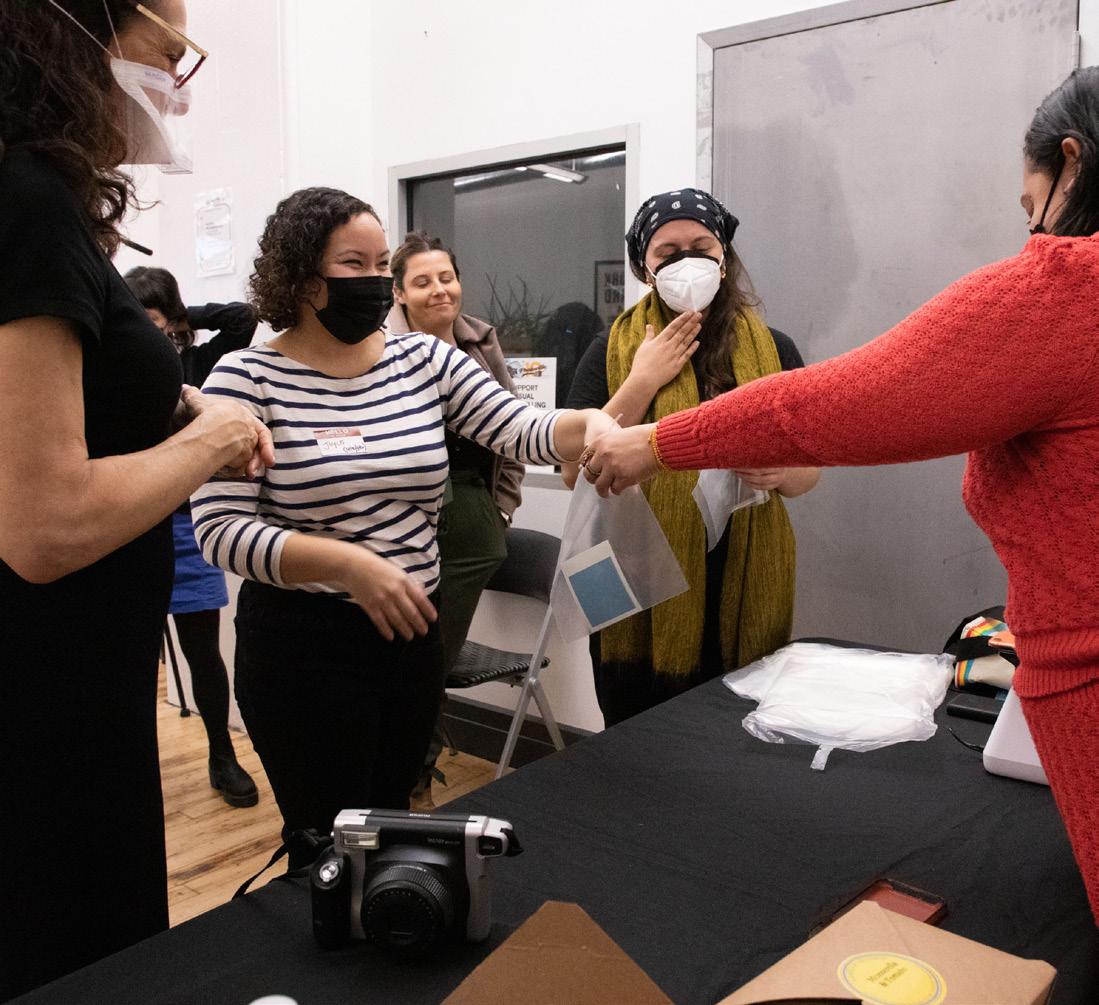
» Cotton Gloves
» Select a Photo
» Measure Photograph
» Place in Archival Sleeve
» Write A Description
» Catalog + File Away
“
”
We are all living archives. The power of knowing how to preserve your photographs, knowing how to tell your story, goes beyond institutions.
- District 75 student alumnus,
Students across D75 have incredible artistic talent, and a powerful voice. When creating artwork, I wanted to express more of the details and how it will reflect on the image.”
“I was very intrigued by how many people were happy with my design process and results. I feel very grateful that I had that connection with people.”
“I wanted to reflect all the people who did something for peoples with disabilities.”
Amanda McFee
- Director for Arts Education, District 75 - city-wide district program for students with disabilities

D75 Arts and the Guggenheim for All Program shut down 88th street to celebrate student artists. During the event, guests viewed student artwork at the outdoor exhibition, and engaged in artmaking stations sketching natural materials and creating a mural. The impact and the pride and self confidence given for a student to show their work publicly is so important.
» Amanda McFee, Director of Arts Programs for the Office of Arts Education District 75 Citywide Programs, NYC Department of Education
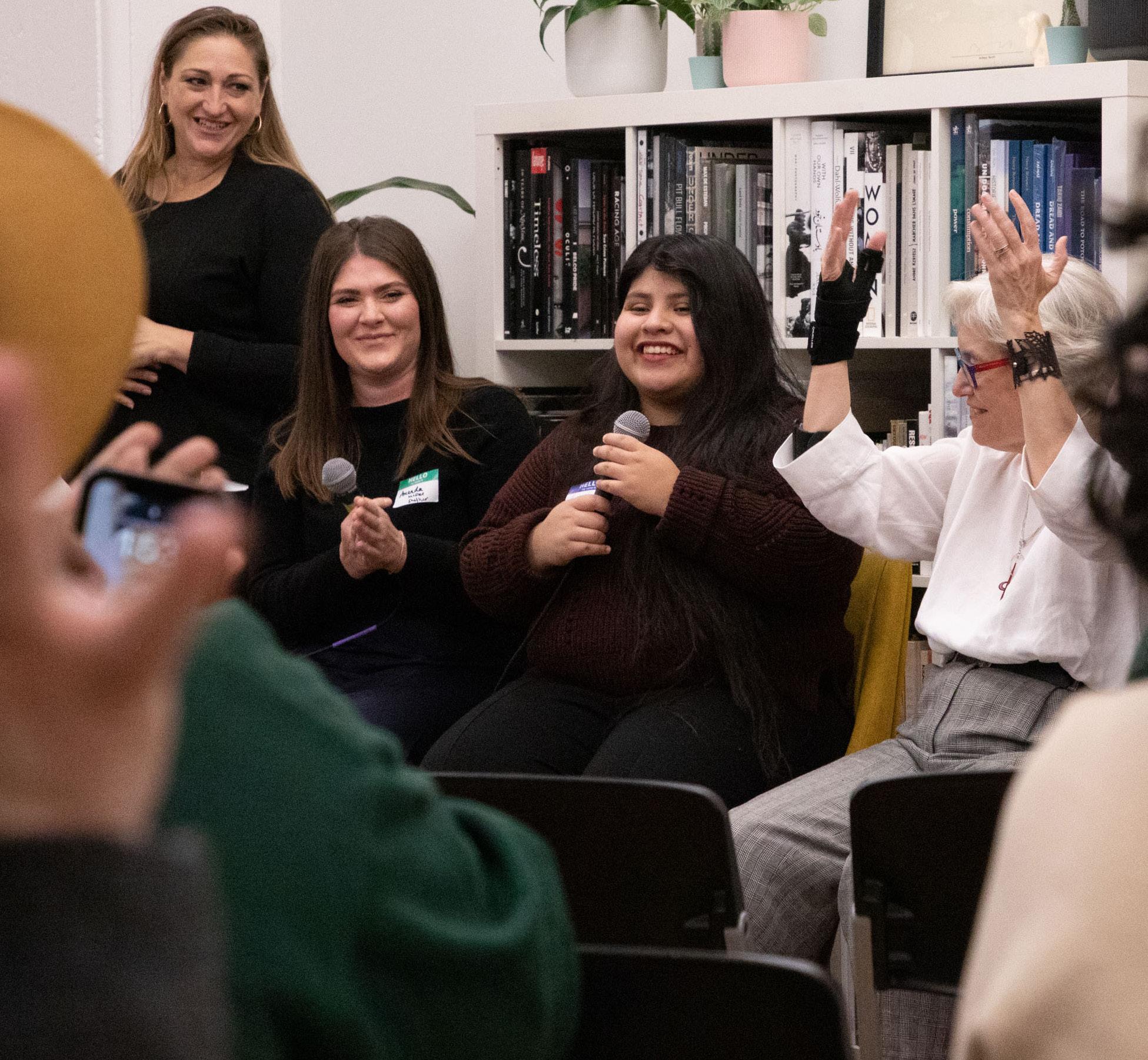
» Carrie Banks, Supervising Librarian, Brooklyn Public Library Inclusive Services
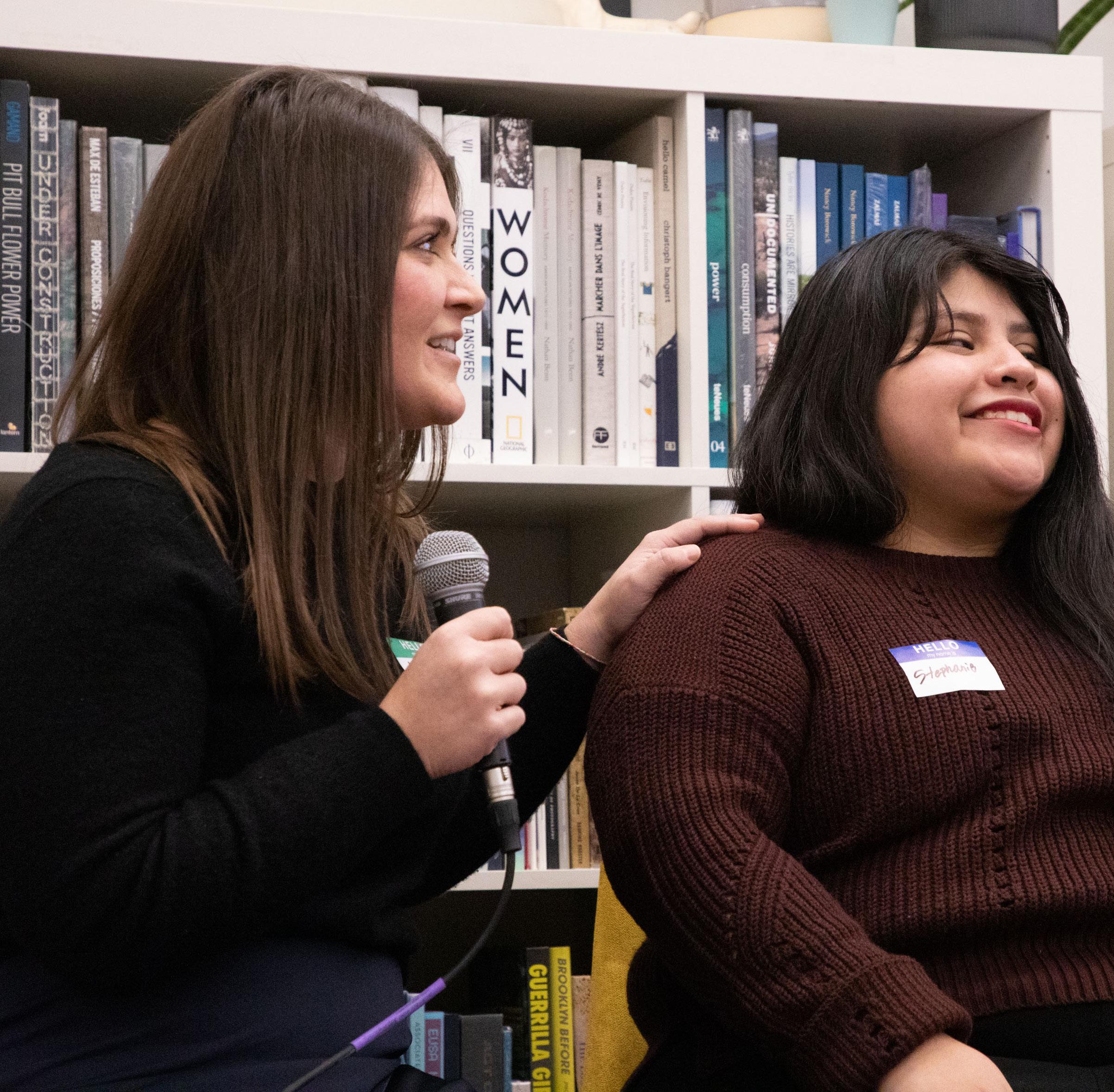
» Stephanie Garcia, District 75 Alumni
» Rick Guidotti, Founder/CEO of Positive Exposure
It’s important to share resources in terms of expansiveness. There’s been a lot of scarcity recently. We want to come from a place of abundance. This is about connection. Resources are often not shared so openly or freely, whether it’s funding challenges or whatever else, so this is an opportunity to share. What’s out there for our students? What are the pilot programs that involve the visual arts that can be introduced?
- Positive Exposure

Fashion photographer based in NYC
“Celebrating the beauty and richness of our shared humanity. I’m so aware that we all have the exact same need: A need to be seen, a need to be heard, and a need to belong.” Struck by the beauty of a girl in New York City with Albinism. Decided to look into it, went to Barnes & Noble medical textbook that showed albinism in cancer clinics, children naked or in their underwear. More negative representations in media (DaVinci Code, The Matrix)
Photographed a model, Christine, with albinism in the same way he would photograph Cindy Crawford and her confidence grew. Positive Exposure’s goals are to Change How You See, See How You Change, Redefining Beauty
His images of Albinism around the globe won the Art of Reporting Award for the Genetic Alliance.
- Inclusive Services at the Brooklyn Public Library
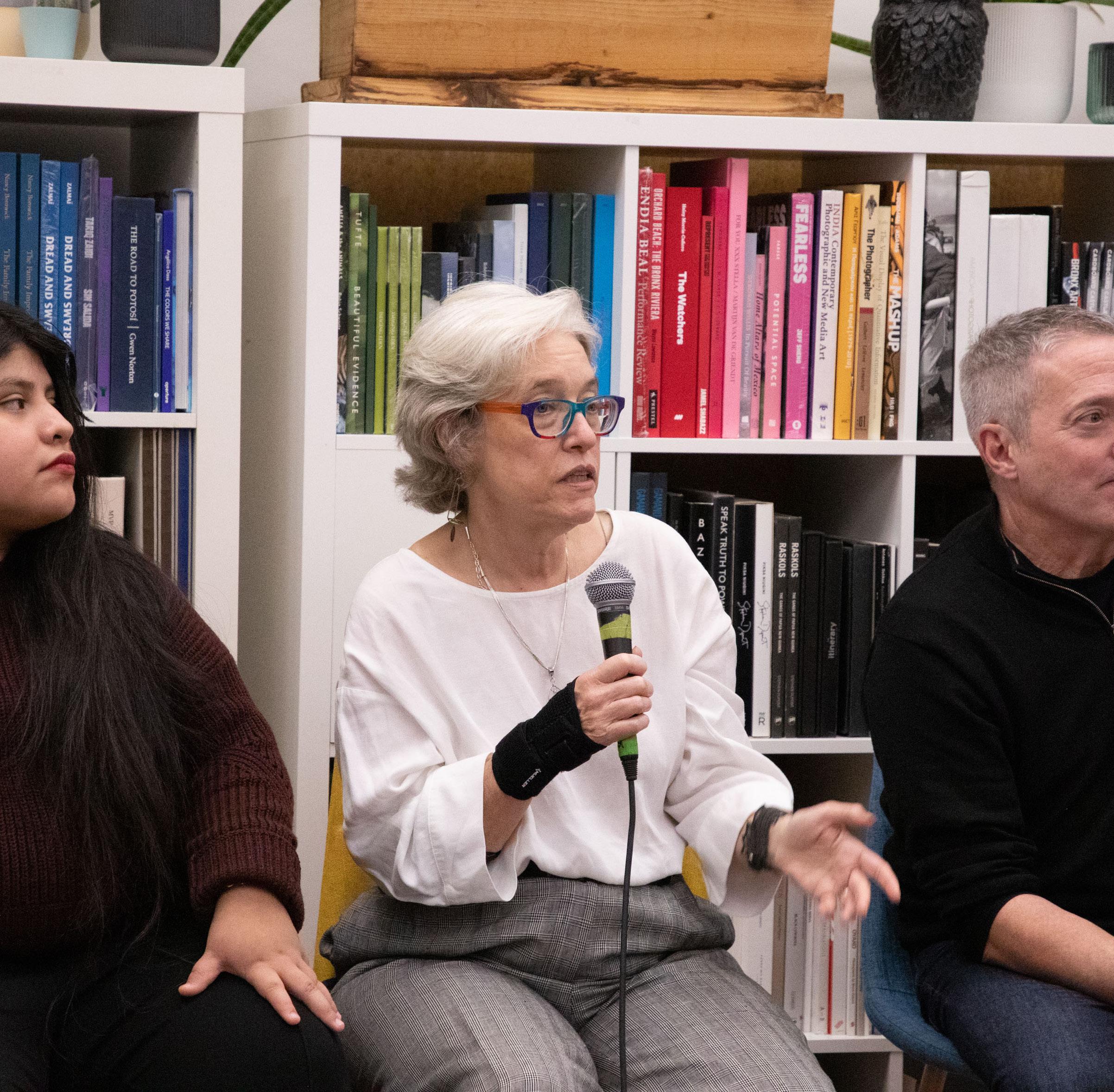
Every student deserves to have a library card - access to the arts, literature, culture, all of the things the library has to offer. Creating a culture of inclusion Culture, Social model of disability, Universal Design for Learning Medical Model of Disability: disability is a “problem” or an “impairment” Social Model of Disability: how to incorporate inclusivity. Universal Design for Learning, Multiple Means of Representation
* Inclusive services at Brooklyn Public Library incorporates multiple means of access and engagement:
* Sensory Regulation Tools
* Sensory Seeking
* Fidgets
* Noise canceling headphones
* Sunglasses, Quiet space
District 75 mission: quality and rigorous individualized educational programs to students with significant challenges and diverse languages.
Arts-based instruction promotes student achievement in the areas of communication, socialization, selfexpression, independence, and arts proficiency; creating increased opportunities for students to reach their individualized Education Programs.
We believe students across D75 have incredible artistic talent, and a powerful voice.
Visual Arts Connection to Literacy: literacy is a fundamental right for every student.
* Reading imagery
* Interpreting and discussing
* Text to self connections
* Self expression through art-making and discussions

* To look at something, take meaning from something, asking about our connections to the material, and then sharing that expression with others
* Get Ready to Click - Student PD
* Joy of Giving & Josephine Herrick Project
* Photoville Partnership
* Photography is a constructive way for students to express themselves especially through smart phones and new technology, especially for students with disabilities (motor or mobility skills)
* To use photography as active voice


Jen is an Afro-Latina disabled art activist, designer, and educator whose visual work explores the intersection of content and caregiving with an emphasis on redesigning ableist visualculture. As an artist, educator with Graves disease and ADHD, her heartcentered and electric approach to disability advocacy bolsters these movements with invaluable currencies: powerful,dynamic art and media that all at once educates, bridges divergent worlds, and builds a future that mirrors her Autistic son’s experience. Jen has presented her activist work and collaborated with a number of brands and art spaces across print and digital such as Twitter, Target, Converse, and Apple. Her photography and design have been featured in The Washington Post, The New York Times, AfroPunk, CNN, Latina.com, Teen VOGUE and is permanently archived in libraries at The Metropolitan Museum of Art, Princeton University, and National Museum of Women in the Arts in DC. In 2021 she was listed as 20 Latino Artists to watch on TODAY.com
Jen currently teaches as Adjunct Faculty at the Maryland Institute College of Art, where she is also an alumnus, having received her MFA in Graphic Design in 2010. She currently lives in Baltimore with her husband and 10-year old son.
Noncommercial, nonprofessional, smallcirculation magazines which their creators produce, publish, and distribute themselves. Different types of zines can include: Photo, Comix, fan, compilation, DIY, fanzine, personal, or political.
Community
Eradicating Ableism
Mothering As An Act of Resistance



I love that zines can be a tool for democracy, autonomy, design and language justice, ultimately creating and activating a culture of access. “Zines are a really beautiful way to initiate the language and culture of access. The zine-making process became an amazing space for collectivity.



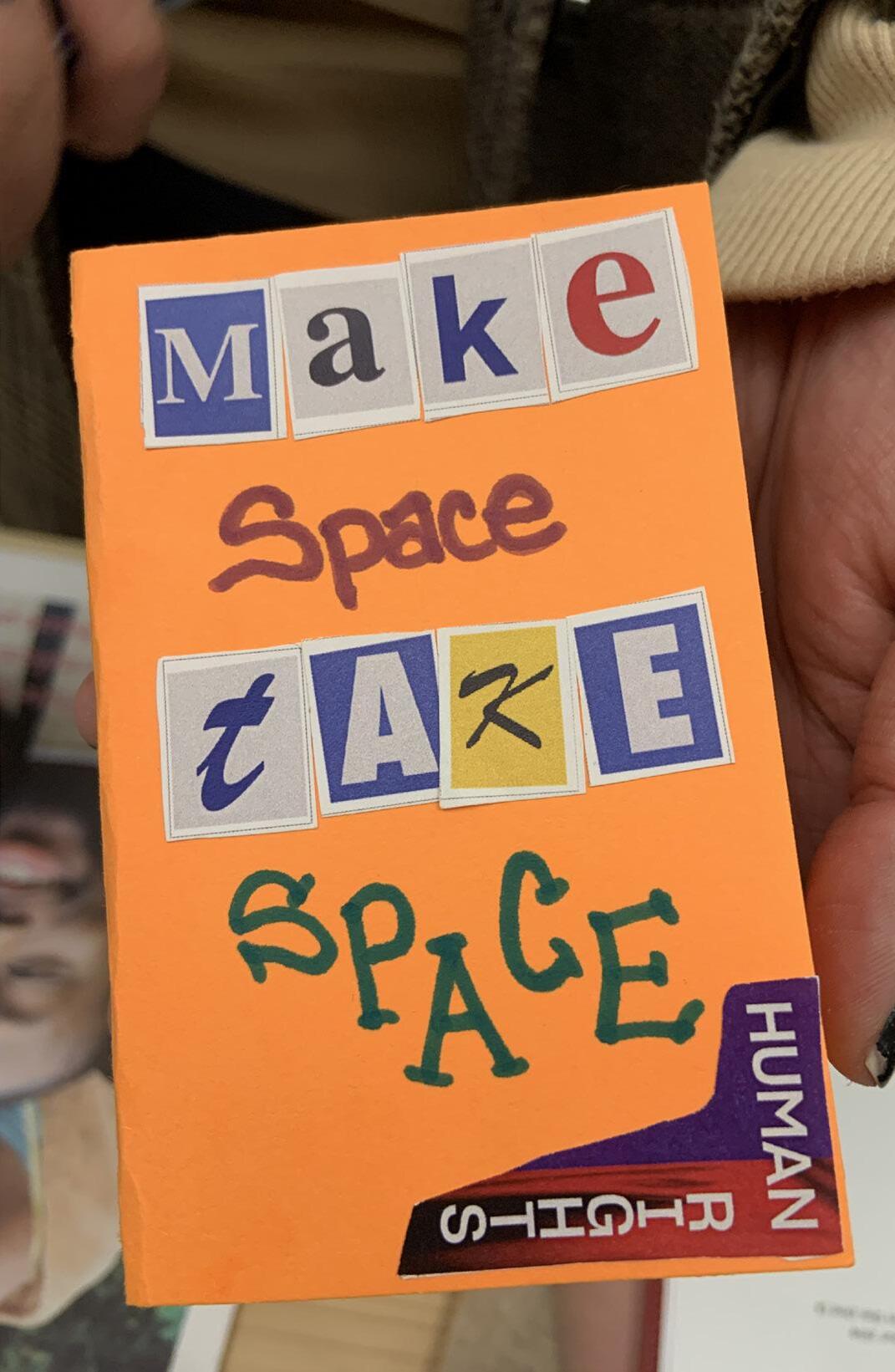
Zines aren’t meant to be perfect and instead are meant to create community. Zines remind people that anyone can make art with the resources they already have, and formal or special training isn’t necessary to make them.




Jen White-Johnson will lead the Photoville community in a photo zine-making workshop using digital and nondigital tools. Participants will explore how zine making can be used as a form of political protest in and outside the classroom and disability justice community space. Engaging with Jen’s Zine Collection, which includes Disabled Higher Ed students and community-produced zines, on disability justice and links to zine libraries from various universities, participants will also discover how zines can give voice to Higher Ed and K-12
students from marginalized groups and perspectives and will hear about the value of zines in combating academic ableism and holding space for the democratic process. In addition to understanding Disability Justice and anti-ableist practices, we’ll review the 10 principles of Disability Justice. We’ll also examine Jen’s Anti-Ableist Art Educators Manifesto to shows how ableist language can harm the disabled community. We will explore how both Disability Justice and Language Justice impact education, and social and political spaces.
When my son Knox was diagnosed as Autistic at age 3, I began to examine the absence of Black disabled children in digital and literary media

“
Our disabilities are what empower us, what make us unique and amazing, and allow us to continue to walk on that road of individuality. Those are the things that are important to uplift in the classroom. Name it.
Me checking out of academia, and me delving into my own story – to specifically showcase what being Black and neurodivergent can actually be, in a way that is respectful and not exploitative, I created zines amplifying disability idenitity and culture in and outside the classroom.
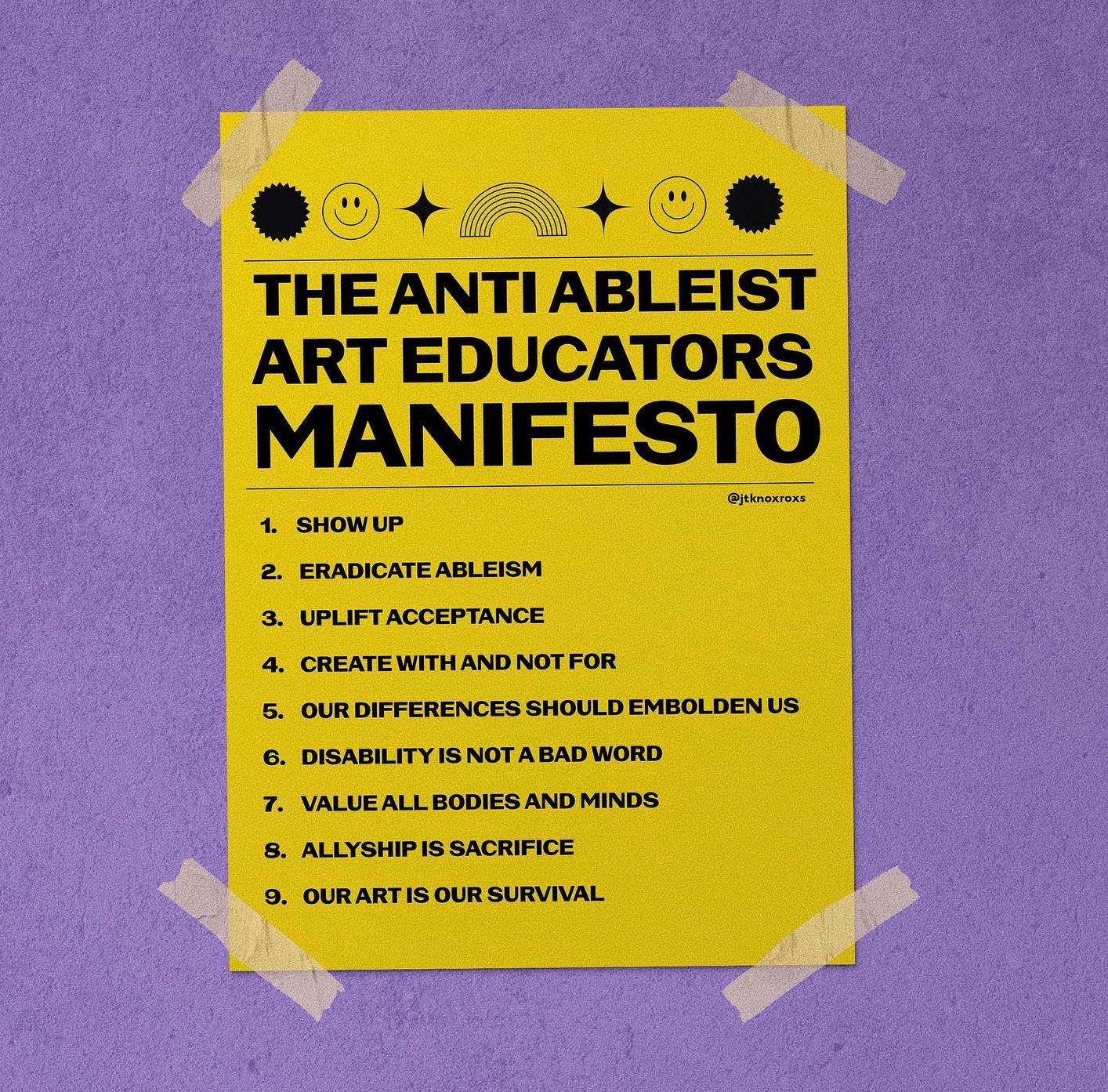
The principles raised in The Anti-Ableist Art Educators Manifesto are meant to call out and dismantle the oppression and demonization brought upon Black and Brown disabled community, specficially students that is fueled by ableism. Anti-Ableism and Collective liberation stems from the understanding that we have struggles that are all deliberately and intimately connected, and that working together, through community, allows us to use the labor of lovejustice to transform justice. In order to create more anti-ableist spaces this manifesto asks the community to collectively Show Up, Eradicate Ableism, Uplift Acceptance, Create with and Not For, Allow our Differences to Embolden us, Declare that Disability is not a Bad Word, Value all Disabled Bodies and Minds, Know that Allyship is sacrifice, and Realize that Art is connected to the survival Black and Brown Disabled communities.
Disability justice activists have organized around a wide variety of issues like:police violence and murder of disabled and Deaf BIPOC, and prison justice for disabled and Deaf imprisoned BIPOC Medical abuse, denial of care and experimentation on disabled BIPOC communication, Climate justice, surviving climate catastrophe, and fighting for the rights of disabled elder and medically vulnerable people to survive climate events
10 Principles of Disability Justice by Sins Invalid
* Intersectionality
* Leadership of those most impacted
* Anti Capitalist politic
* Commitment to cross movement organizing
* Recognizing wholeness
The Adovocazine is a zine for care & selfexpression, created by 2 design moms with their neurodivergent sons.


Use as a tool to help communicate strengths & challenges while facilitating collaboration with your kiddo’s IEP team, teachers, therapists, & other community members. Great for practicing self-advocacy!
* Sustainability
* Commitment to cross disability solidarity
* Interdependence
* Collective access
* Collective liberation
Photoville Education provides year-round programming to engage young people and educators with visual storytelling through workshops, resources, and field trips.

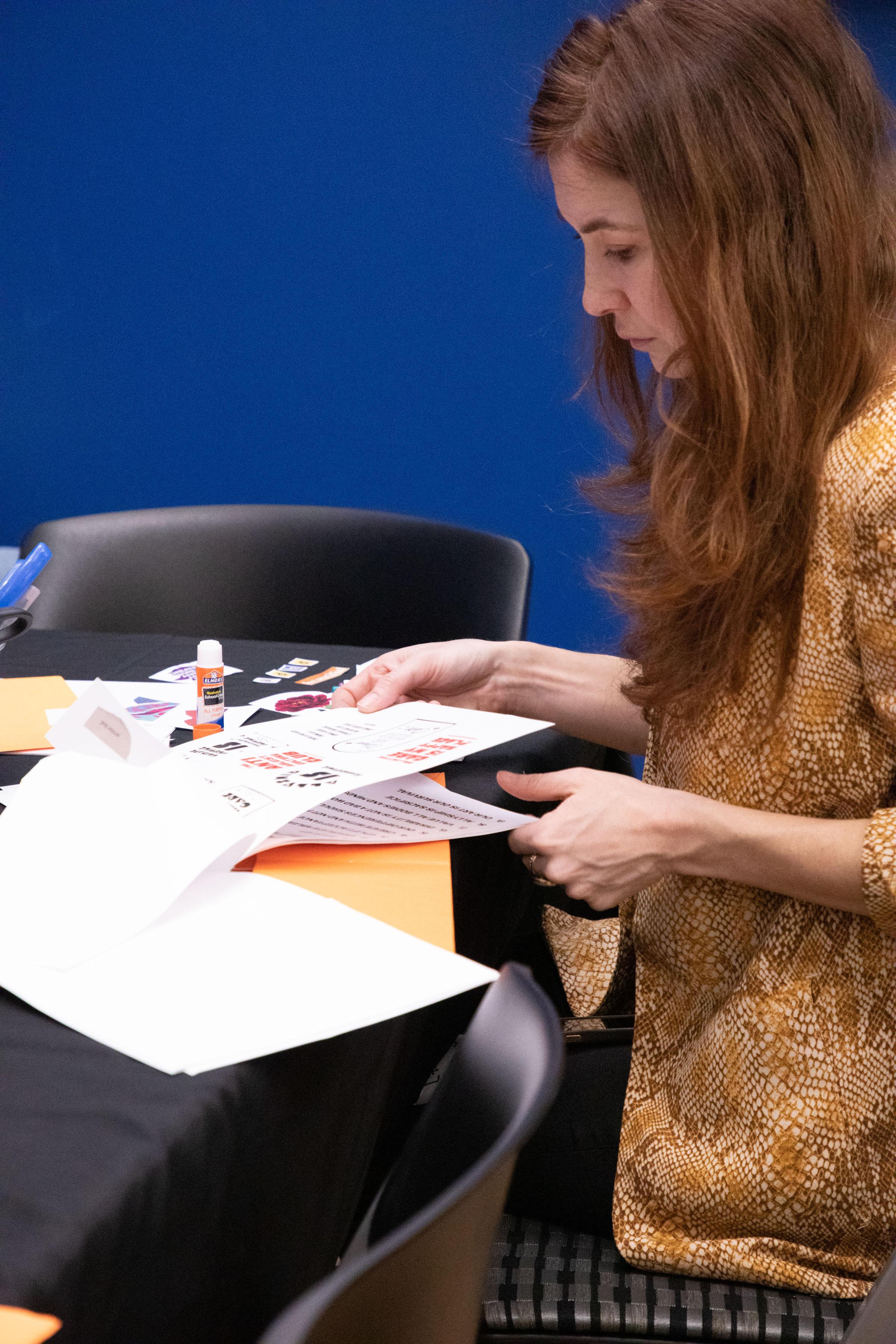

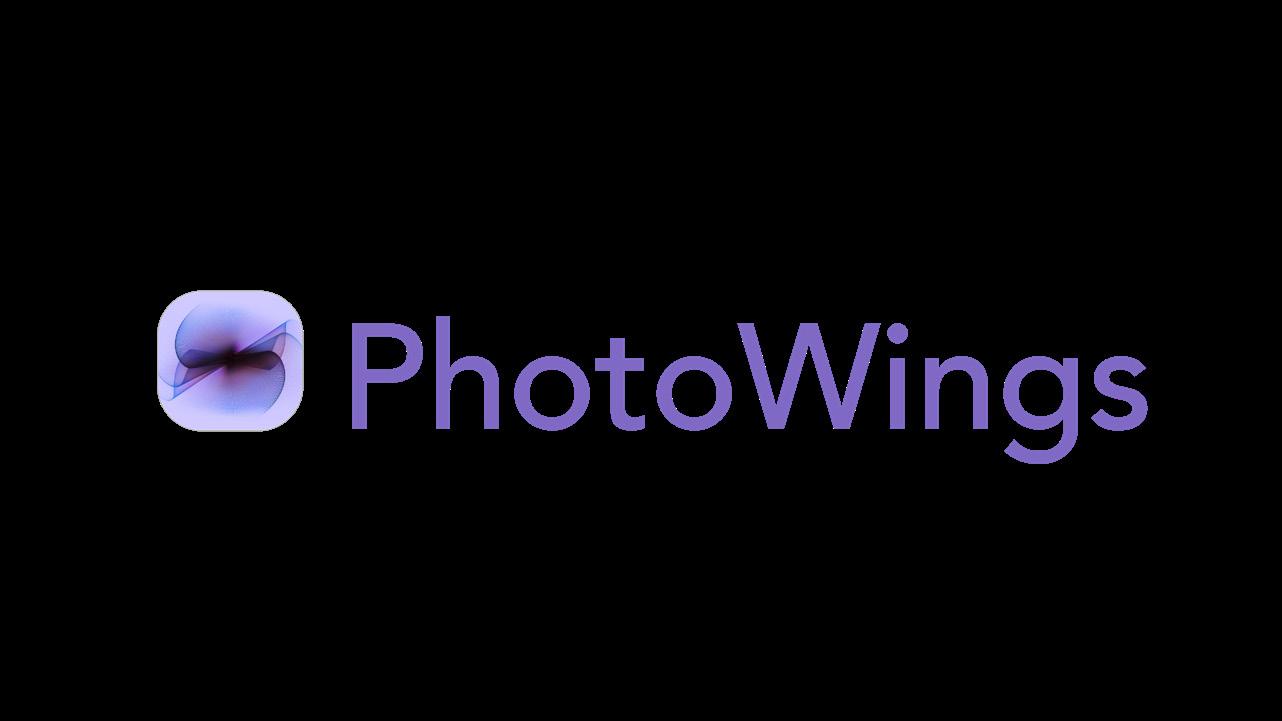
PhotoWing’s mission is to highlight and help facilitate the power of photography to influence the world. They help photography to be better understood, created, utilized, seen, and saved. They are dedicated to utilizing the power of photography to further deep thinking, communication, and action. The PhotoWings Outreach Program and their extensive media archive have myriad educational applications and possibilities, including projects from partners that cross disciplines, generations, and cultures. They also create toolkits/curricula for replication, adaptation and/or inspiration.
www.photowings.org
Thank you for coming along this journey with us. Make sure you check out Photoville education lesson plans, artist videos and tool kits.
Thank you to PhotoWings, District 75, Amanda McFee, Stephanie Garcia, Carrie Banks, Rick Guiodotti, the ASL interpreters! Stephanie Alvarado, Jen White Johnson

Designed by, Jen White-Johnson

For more information, visit: www.photoville.com
Produced in partnership with:
Photographs by Julie Thompson
